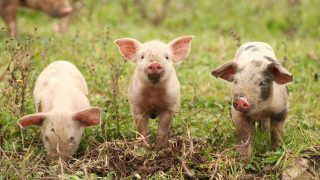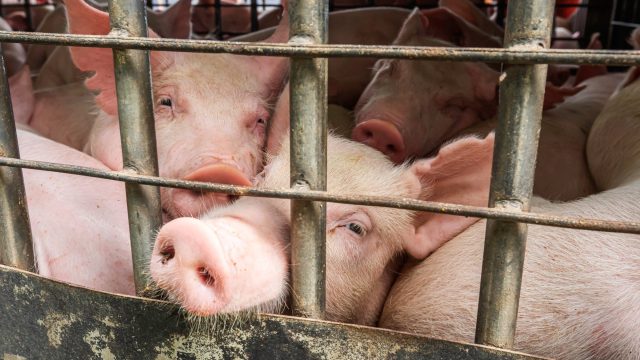
Boston College Law School’s Cage-Free Egg Campaign
The beginning of my first year of law school brought many school events, including the student organization fair. Much to my surprise, while every other imaginable organization was represented, there was no Animal Legal Defense Fund Student Chapter. That day, I petitioned the Dean of Students for a new organization–the Boston College Law School Animal Legal Defense Fund Chapter. I quickly made the arrangements for the first meeting and advertised by pasting flyers all over campus. The first meeting drew a small crowd of deeply interested students. We set out an agenda and a list of feasible projects.
The first project that we undertook was to compile a list of books, documentaries, websites, and blogs related to animal law and animal welfare issues. While the list continues to grow, it is a great bibliography that serves as a quick reference on particular issues and can be easily handed out to people interested in the subject.
While an animal law class had been taught in previous years at Boston College, I wanted to ensure that it would be taught while I was a student. Using the backdrop of our newly developed group, I petitioned the Dean of Students on behalf of our members and other students who were interested in an animal law class. The petition was successful and the class was put on the Fall 2009 schedule.
In the fall semester, we teamed up with the Committee to Protect Dogs, the organization that spearheaded the campaign to end greyhound racing in Massachusetts. We decided to get out the vote on Question 3, which was the 2008 Massachusetts ballot question that would ban greyhound racing.
During lunchtime, we handed out information and set up tables in the cafeteria to talk to students and administration about the inhumane greyhound racing industry.
In the spring 2009 semester, we strategized a campaign to convince Boston College to stop using eggs from hens kept in battery cages and instead switch to using cage-free eggs. We contacted the Humane Society of the United States (HSUS) and worked with Josh Balk, the outreach director for the Factory Farming Campaign, to organize our strategy. Josh provided us with information to present at our first meeting with Boston College Dining Services.
Also, we decided to join forces with the Boston College Environmental Law Society (ELS) in presenting our proposal to Boston College Dining Services. We teamed up with the Boston College ELS to demonstrate that besides the cruel and inhumane practices of battery-cage facilities, there are tremendous environmental concerns as well that are linked to industrial-sized battery-cage facilities, such as generating industrial-scale, toxic pollution that can and does contaminate nearby streams, lakes, and local water bodies and threatens drinking water supplies with pathogens, chemicals, and antibiotics added to feed.
Our first meeting went exceedingly well and all three interests (Boston College’s Animal Legal Defense , ELS, and Dining Services) hatched a plan to conduct a six-week trial run in which the Boston College Law cafeteria would begin using cage-free shelled eggs.
Boston College Dining Services wanted to ensure that the people frequenting the cafeteria would not object to the few cents increase in price and also the potential change in taste. Thus, before making the decision to permanently institute a cage-free policy with their shelled eggs, Boston College Dining Services agreed to a trial run.
During this six-week campaign, we advertised our campaign throughout the law school with high-quality posters. In order to convey what a battery-cage looks like and how much room each chicken was allowed, we were able to secure an actual battery-cage that was once used in an industrial factory farm. Providing this type of visual representation of a battery-cage proved to have the most impact on students, many of whom did not know of the barbaric practices used by most chicken farms. Additionally, we handed out information on the egg industry.
At the close of the six-week campaign, Boston College’s Animal Legal Defense Fund Student Chapter presented Dining Services with a thank you letter attached to a petition signed by more than 400 students, professors, deans, and staff asking that the cage-free policy be permanently implemented on campus.
We met with Dining Services to hear the decision and it turned out that the campaign was such a success that their profits in the sale of eggs increased during the six-weeks of using cage-free eggs. Thus, after a few days of talking further with dining officials, we received the final word that not only would the Boston College Law cafeteria switch to using cage-free shelled eggs, but so would the entire campus, which includes four cafeterias and their catering services. This success was a great way to end the first year of the Boston College’s Animal Legal Defense Fund Student Chapter.
As the second year of the Boston College’s Student Chapter gets underway, we are planning various projects such as working with Boston College Dining Services to use 100% cage-free eggs which would encompass liquid eggs used in cooking. Additionally, we will be screening the HSUS documentary, “Flu Factories,” which discusses swine flu’s strong ties to factory farming.
With the success of our first year, I am confident that we will be able to have as much success this year. With the Animal Legal Defense Fund’s support, resources, and guidance, the Boston College Animal Legal Defense Fund Student Chapter has become a formidable student organization at the Boston College Law School, making positive changes that have far reaching effects on animals, the environment, and the health of the law school community and laborers in organizations that supply Boston College with eggs.
This spotlight was submitted by Natalie Prosin, president of Boston College Law School Animal Legal Defense Fund Student Chapter.
Focus Area
How We Work
Recent News
-
California: Ban Cruel Octopus Farming!
Ask your state assemblymember to support the California Oppose Cruelty to Octopuses (OCTO) Act (A.B. 3162) to protect octopuses and marine ecosystems. -
Animal Legal Defense Fund Grant Supported Washington Attorney General’s Enforcement of Animal Cruelty Law
The judge sentenced a Snohomish County resident for killing then displaying neighborhood wildlife and shooting a kitten in the eye.April 18, 2024 News -
Animal Law Symposium 2024: State Confinement Laws and the Future of Farmed Animal Policy
All sessions are now available on demand!April 16, 2024 Article



